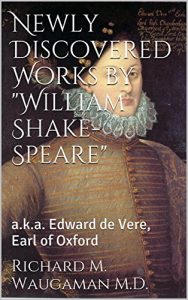
Richard Waugaman, M.D., Clinical Professor of Psychiatry at Georgetown University and author of 70 articles, book chapters, and book reviews on Shake-speare, has recently published the second edition of his first ebook, Newly Discovered Works by “William Shake-Speare,” a.k.a. Edward de Vere, Earl of Oxford. The second edition contains two new chapters, and 30% more material than the first edition.
For a limited time, January 28 through February 1, free copies are available from Amazon.
The book collects previously published and some unpublished material. It examines anonymous poems and the anonymous Arte of English Poesie, explaining why Waugaman attributes them to de Vere.

Waugaman’s attribution of the Arte to de Vere remains controversial. So he devotes two chapters to it, and uses material in other chapters to strengthen his case. Waugaman believes that the extraordinary beauty and power of de Vere’s language owes much to his careful study of rhetoric. This included de Vere’s 1570 translation of a Latin treatise on rhetoric by the German humanist Johann Sturm. One chapter explores the previous attribution of the “Golding” translation of Ovid’s Metamorphoses to the adolescent de Vere. Waugaman subjects the translation to an intensive philological analysis, finding abundant evidence of quirky spellings that are all but unique to de Vere, along with the highly Shakespearean use of word pairs, known as “hendiadys” (one through two, a rhetorical figure also found in de Vere’s translation of Sturm). If de Vere was the translator of this work, it certainly explains why it is widely recognized as one of Shake-speare’s top four literary sources.
In a blog two years ago, Mark Anderson singled out one chapter in this book as being of special significance. Mark believes that Waugaman’s attribution of an anonymous 1578 poem in a female voice to de Vere offers us our first “soliloquy” of a female Shakespearean character.
Some who already own the first edition have asked how to obtain the new edition, with two new chapters and other revisions. Amazon says that they have agreed to notify those owners that they can request the new edition. Be aware that this means your annotations will disappear. No way around that, apparently. Amazon wrote to Dr. Waugaman:
“We’ve reviewed the changes to your book, and we consider the content updates to be MAJOR quality corrections. I’m pleased to inform you that we’ve sent an e-mail to customers who own the book to notify them of the update. These customers can download the update through their ‘Manage Your Content and Devices’ page.”
Dr. Waugaman says that he would welcome Amazon reviews of his book.


